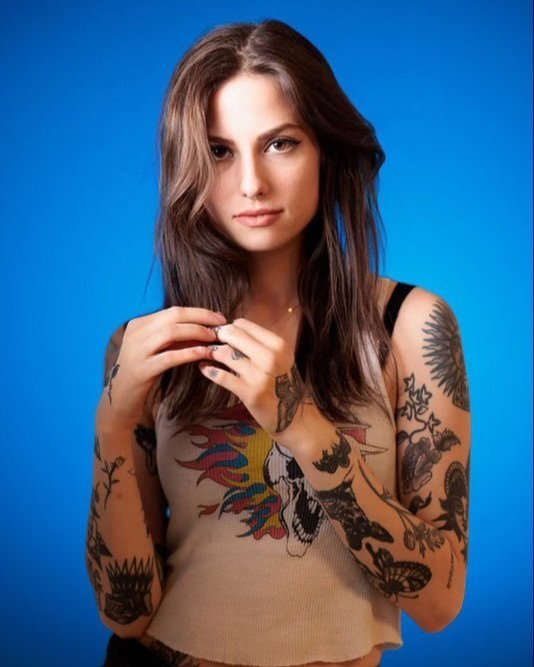Hell Yes Fest is Cracking Up

The New Orleans comedy festival opens tonight with a show on the relationship between mental health and comedy.
The stereotype of stand-up comedians is that they’re neurotic messes. The game show structure behind Comedy Central’s @Midnight seems to heighten the stand-up contestants’ antic qualities, and NPR’s Linda Holmes affectionately described comedian Marc Maron as “an open wound”—a phrasing he might not choose but an emotional assessment he doesn’t deny. (Listen to the episode that goes behind the scenes on President Barack Obama’s visit to his garage/studio to see how out there Maron can get.)
The Mental Health Channel’s Cracking Up is a web series that explores the relationship between mental health and comedy. The first season took place in Austin, and the second season is set in New Orleans. Season two began with a stand-up showcase at the House of Blues that featured Addy Najera, Cyrus Cooper, Redbean, Katie East and more, and the series follows the comedians through their personal and professional lives. Thursday night The Hell Yes Festival will offer a first look at the New Orleans season of Cracking Up at 8 p.m. at The Old Marquee Theater.
Film is just one component of Hell Yes Fest, the New Orleans comedy festival that runs from October 1-11. It also includes improv, sketch comedy, and its strongest stand-up lineup to date with performances by Doug Benson, Nikki Glaser, Tim Heidecker, Todd Barry, and Baron Vaughn among others. The film festival will conclude Saturday night at 8 p.m. with "Part 2: Unneccessary Pitches," with improv groups pitching and performing ideas for Clueless II to director Amy Heckerling. Tonight's screening of Cracking Up will present the first four episodes of the show.
According to Leon Blanda, who books comedy at the House of Blues and is one of the featured performers on the show, the phrase “mental health” covers a lot in this context. “Mental health ranges from good health to schizophrenia,” he says.
The series examines how mental health “affects everything you do,” Blanda says. “How your particular thing, whether it’s depression or anxiety or fear of talking to crowds, how it affects your writing and your performance. Is your defense to be more boisterous and show bizzy onstage to counteract the fact that offstage you’re a complete introvert and can’t talk to anybody? Mental health affects everything we do. Sometimes you don’t even want to get off the couch.” Because the comedians occupy different points on the scale, their stories illuminate meaningful differences.
“It’s a different journey for each person,” Blanda says.
Blanda has never been diagnosed or treated, but since he was much younger, he would periodically be incapacitated by depression. As he grew up and started reading about depression, he had a vague sense of what was going on—depression, maybe clinical, maybe seasonal, maybe tied to low self-esteem. He could roll with that level of understanding through his 20s when the main consequence was a failed relationship here, a broken friendship there, and maybe a little ongoing tension at work. “Now I’m in my 30s with a three-year-old and I can’t give up three days to a week to this, where I don’t leave the house except to go to work, where I watch TV until I go to sleep or drink myself stupid,” he says. “I’ve got to keep if not a smile on for her, at least a positive attitude.”
In addition to worrying about his behavior might affect his daughter negatively, he hopes that working to cope will help her if the depression that Blanda and his wife both deal with is passed on to her.
“If I can show her that Yeah, dad deals with it too, kid,” he says.
Blanda’s careful not to call his time onstage his therapy—he doesn’t want to denigrate either—but he finds his work makes him feel better, not because it’s comedy but because it’s the craft he has worked to excel at. “If you don’t get some sort of therapeutic feeling from something you want to do, don’t do it. Get some positive energy.”
Blanda didn’t start with comedian dreams. He began by playing in rock bands, but when he felt himself bumping into a ceiling there and lost the passion for it, he spontaneously wrote and started shooting a film. Without a budget, that project fell apart after three days, but he felt like what he had was funny, and because he had always liked stand-up comedy, he tried out on an open mic night. His set went so well that he tossed the hundred-plus pages he had written and began working on jokes for an act.
“I wish I’d found this when I was 11,” Blanda says. “It’s where I feel the most creative and natural. The confidence that I don’t have in my natural life I somehow have being a stand-up comic.”
Leon Blanda will perform stand-up at the House of Blues' "Comedy Boom" Thursday at 8 p.m. The Mental Health Network will debut Cracking Up: New Orleans on its website today, with a new episode posted weekly through December.






